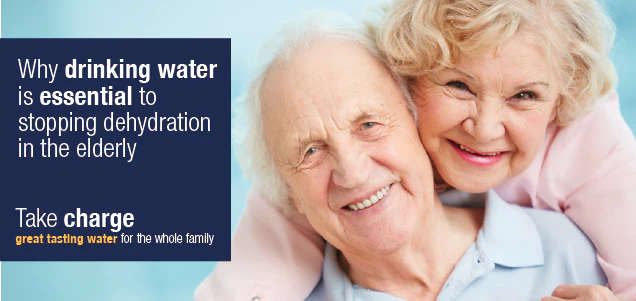Good hydration is essential to health - whatever your age. Yet dehydration in the elderly can be a particular problem as they fail to consume enough drinking water.
Despite access to drinking water being plentiful in the developed world, dehydration in the elderly remains an issue for a number of reasons - and can pose a serious risk to health.
Why is dehydration a problem in the elderly?
The major problem is that many elderly people simply fail to drink enough water. While not being in the habit of drinking water could be a reason for this, another stumbling block is that as people age their ability to know that they are thirsty weakens. For those suffering from Alzheimer's or dementia this problem is even more pronounced.
As the ageing process takes its toll on the body, its ability to keep itself hydrated can also be affected. In particular, ageing impacts the performance of the kidneys and, thereon, the body's ability to interpret and respond to hydration levels.
Dehydration in the elderly can also be added to by the side effects of certain medication - particularly diuretics and laxatives - as well as impaired cognitive function or physical function, particularly when that demands assistance when eating.
Depression has also been flagged up as having a link to dehydration for elderly people.
Addressing the problem
In a care setting, elderly people may need to depend on their carers to access enough drinking water. Ensuring a patient is adequately hydrated is essential to their, and their family's, expectations of care.
Families can also help older relatives to stay hydrated, and reap the benefits of drinking water, by reminding them of the importance of regularly filling up their glass.
When visiting an elderly relative ask them if they would like a drink and encourage them to choose water. Family members can also help by being on the lookout for signs of dehydration.
Investing in a Doulton water filter could help encourage uptake of fluids by improving the taste and the quality of tap water.
If spotted early it is easy to remedy dehydration by drinking more water. But if dehydration is serious, it can have major health implications requiring immediate medical attention.
Symptoms to watch out for
- Thirst
- Feeling light-headed
- Being tired
- A headache
- Going to the toilet less often
In serious cases of dehydration people can have a rapid or weak pulse, appear confused, suffer from dizziness or even not be fully conscious.
Effects on health
Elderly people will find everyday tasks more difficult if suffering from dehydration as it saps their strength. It can also cause heat exhaustion and lead to an increase in falls and subsequent recovery time.
In addition, by becoming dehydrated, elderly people are put at risk of health problems including kidney stones, muscle damage and respiratory tract infections.
Water is vital to wellbeing.
At a time in life when good health should be cherished make sure your elderly relatives don't risk their wellbeing by failing to drink enough water.






